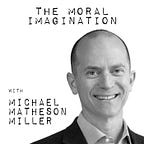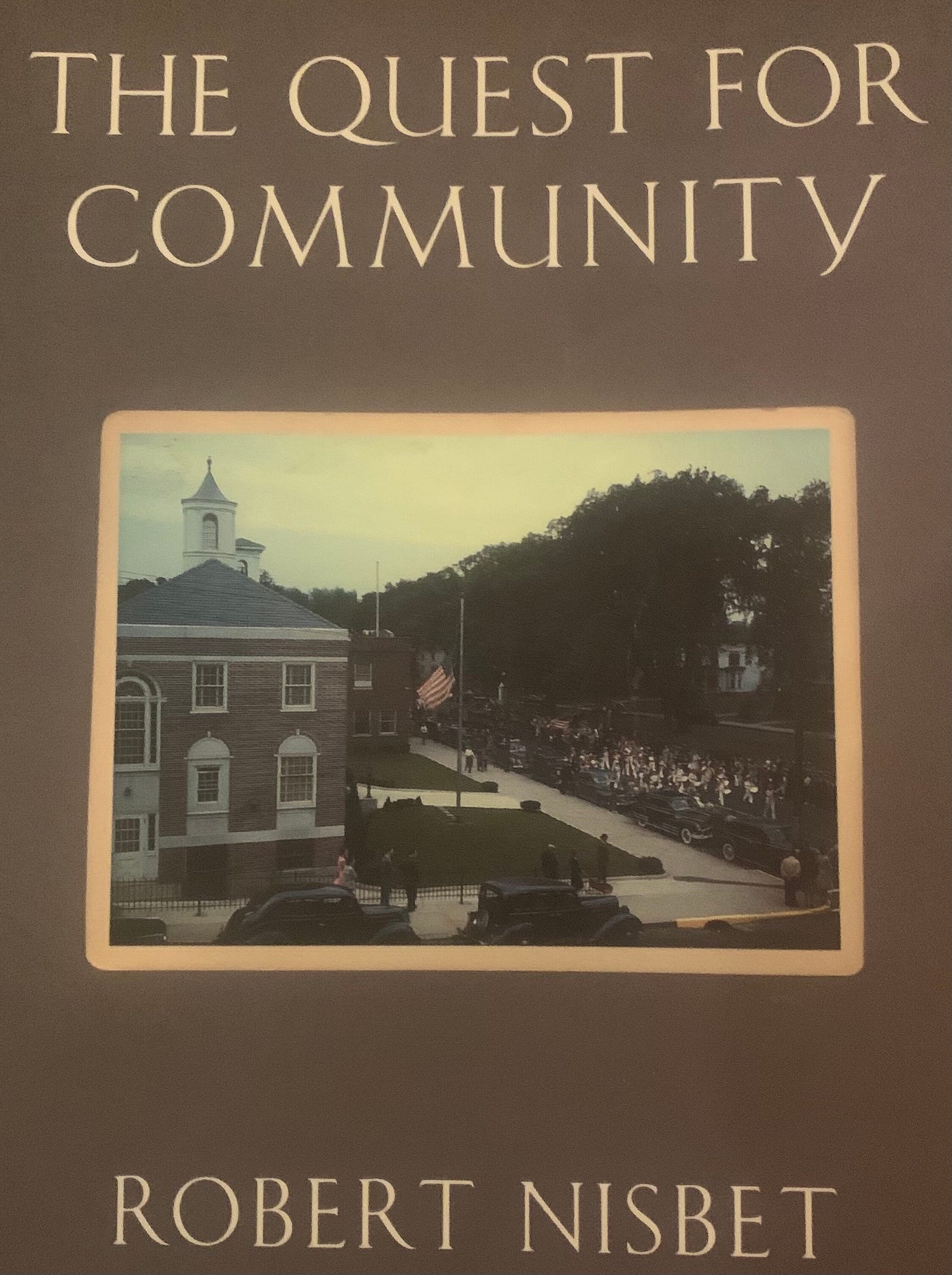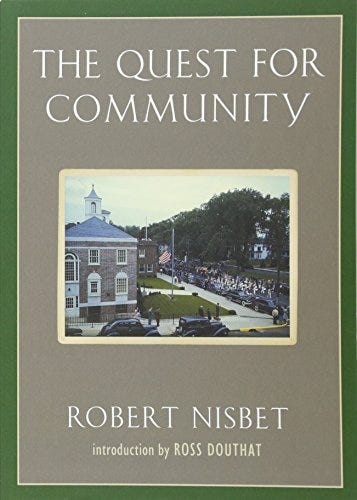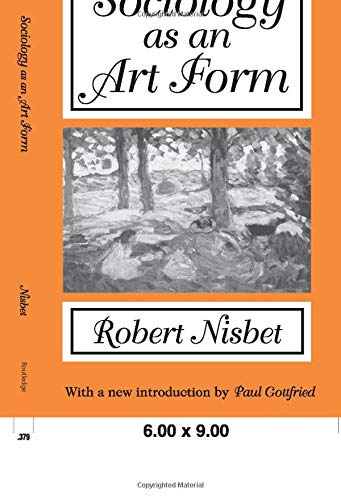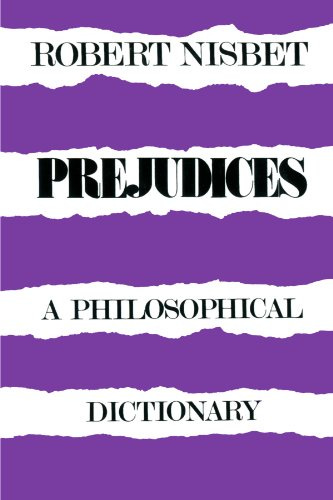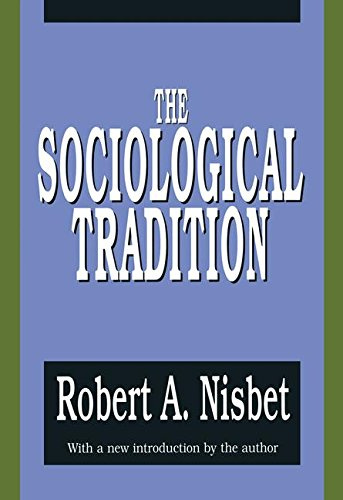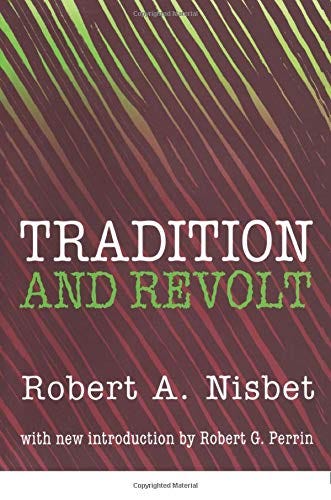This episode is a talk I gave on the thought of the sociologist and social philosopher, Robert Nisbet. Nisbet brings into account Burke and Tocqueville and the counter reaction to the reductionist worldview of the Enlightenment. He talks about importance of community and decentralization, and why there needs to be multiple layers of authority beyond the centralized state. We live a centralized age, not just large nation states, but our technology, big data, collection of our private information stored on massive servers—and I thought it would be good to present the main themes of Nisbet’s work on decentralization, community, authority, social change, monism vs pluralism and more.
Outline
Part I: Robert Nisbet: Vision and Context
I. Introduction: Central Themes
Decline of Community
Authority
Individualism and Centralization
Thinking Sociologically
Recovery of the Social
II. Major Works, Biography, and Influences
§ The Quest for Community
§ Social Change and History
§ The Sociological Tradition
§ Sociology as an Art Form
§ Emile Durkheim
§ The Social Bond
§ The Making of Modern Society
§ Tradition and Revolt
§ The Social Philosophers
§ Social Change, editor
§ History of the Idea of Progress
§ Metaphor and History
§ The Twilight of Authority
§ The Degradation of Academic Dogma
§ Prejudices: A Philosophical Dictionary
§ Conservatism: Dream and Reality
Biography
Maricopa, CA “Hostile to the human spirit” (MMS)
Fredrick Teggart: Social Institutions
UC Berkley
UC Riverside
Columbia
AEI
Influences
§ 19th Century Conservative Reaction to Revolution
§ 19th Century Sociological Tradition
§ Bonald, Le Play, Durkheim, Haller, Comte Chateaubriand
§ Alexis de Tocqueville
§ Edmund Burke
III. Overview of Main Concepts in Nisbet’s Work
A. Social Change /Development / Progress
(SCH, HP, MMS, SC, QC, State and Family)
B. Rise of Individualism (QC, ST, MMS, TA, SP)
Hobbes, Rousseau
Modern State grounded on the individual –sets stage for centralization
C. Two Revolutions (ST)
Industrial Revolution
Condition of Labor
Transformation of Property
o Large Scale Industrial Property—Transfer of Political Power from Land to Capital
o Burke: New Dealers
Industrial Urbanism
Technology
Factory System
French (Democracy)
Individual
Associations
Family
Education
Church
Effects of the Revolutions: Individualization, Abstraction, Generalization (ST)
Individualization
Group to Individual
Guild to Entrepreneur
Class/Estate to Citizen
Corporate/Liturgical Tradition to Individual Reason
Abstraction
Related to Individualization—but in moral sphere: Historic values became increasingly secular, utilitarian, but also “separated from the concrete and particular roots…which had given them symbolic distinctiveness and means of realization” (ST)
Generalization
Broadening of man’s thought to the general—from the family and local community to the nation, to democracy, and international order. Seeing others in the aggregate: the poor, the working class, capitalist, master, voters, bureaucracy, citizenry etc.
Methodological Individualism and the two Revolutions provide the context for the rise of sociology, and for Nisbet’s work on Community and Authority.
Part II: Community, Authority, and Liberty
I. Individualism and Centralization
§ Strong Connection between Individualism and Centralization
o Tocqueville, Democracy in America, Vol. 2, Book 4, Chapter 2-3
§ Individual vs. Association/ Group
Modern
§ Role of Equality
II. The Quest for Community
Nisbet identifies 4 types of Community (SP)
Political Community (SP, QC, TA)
Religious Community
Ecological Community
Revolutionary Community
Monism vs. Pluralism
Monism: Unitary vision of the state—Political Community of Rousseau and Bentham
Pluralism: Social diversity and various levels of authority: Burke and Tocqueville
III. Restoration of Authority
Functional Autonomy
Decentralization
Hierarchy
Tradition
Reliance on non-formal law—“governance vs. government”
Compare with Tocqueville: Three main obstacles to “soft despotism”
IV. “New laissez-faire”: Revival of Localism
A laissez-faire of associations and social invention
Two Traditions of Citizenship: Burke vs. Rousseau
New laissez-faire is the Burkean view of plurality and social diversity that “citizenship must be rooted in the groups and communities within which human beings actually live.” (TA)
Part III: Conclusions : Lessons from Nisbet
1. Individualism and Centralization
2. Thinking Sociologically
3. Incorporate 19c Conservative and Sociological Reflection on Liberty
4. Application of Burke and Tocqueville to Contemporary Democracy
a. Renewed Appreciation for the Social—The Importance of Associations
5. Alternative to much of Communitarianism and contemporary localism
a. Limited Government approach to community and localism
6. Awareness of new and traditional forms of community
For more on Robert Nisbet listen to my podcast with Brad Birzer
By Nisbet, Robert
By Nisbet, Robert
Prejudices: A Philosophical Dictionary
By Nisbet, Robert
By Nisbet, Robert
Routledge

